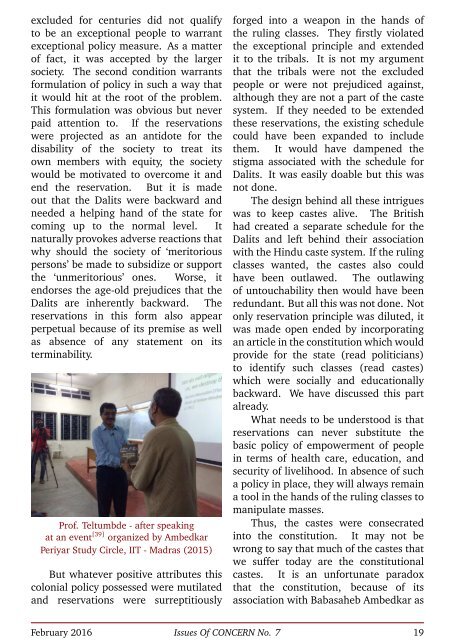ISSUES OF CONCERN
Issues_of_Concern_February_2016
Issues_of_Concern_February_2016
Create successful ePaper yourself
Turn your PDF publications into a flip-book with our unique Google optimized e-Paper software.
excluded for centuries did not qualify<br />
to be an exceptional people to warrant<br />
exceptional policy measure. As a matter<br />
of fact, it was accepted by the larger<br />
society. The second condition warrants<br />
formulation of policy in such a way that<br />
it would hit at the root of the problem.<br />
This formulation was obvious but never<br />
paid attention to. If the reservations<br />
were projected as an antidote for the<br />
disability of the society to treat its<br />
own members with equity, the society<br />
would be motivated to overcome it and<br />
end the reservation. But it is made<br />
out that the Dalits were backward and<br />
needed a helping hand of the state for<br />
coming up to the normal level. It<br />
naturally provokes adverse reactions that<br />
why should the society of ‘meritorious<br />
persons’ be made to subsidize or support<br />
the ‘unmeritorious’ ones. Worse, it<br />
endorses the age-old prejudices that the<br />
Dalits are inherently backward. The<br />
reservations in this form also appear<br />
perpetual because of its premise as well<br />
as absence of any statement on its<br />
terminability.<br />
Prof. Teltumbde - after speaking<br />
at an event [39] organized by Ambedkar<br />
Periyar Study Circle, IIT - Madras (2015)<br />
But whatever positive attributes this<br />
colonial policy possessed were mutilated<br />
and reservations were surreptitiously<br />
forged into a weapon in the hands of<br />
the ruling classes. They firstly violated<br />
the exceptional principle and extended<br />
it to the tribals. It is not my argument<br />
that the tribals were not the excluded<br />
people or were not prejudiced against,<br />
although they are not a part of the caste<br />
system. If they needed to be extended<br />
these reservations, the existing schedule<br />
could have been expanded to include<br />
them. It would have dampened the<br />
stigma associated with the schedule for<br />
Dalits. It was easily doable but this was<br />
not done.<br />
The design behind all these intrigues<br />
was to keep castes alive. The British<br />
had created a separate schedule for the<br />
Dalits and left behind their association<br />
with the Hindu caste system. If the ruling<br />
classes wanted, the castes also could<br />
have been outlawed. The outlawing<br />
of untouchability then would have been<br />
redundant. But all this was not done. Not<br />
only reservation principle was diluted, it<br />
was made open ended by incorporating<br />
an article in the constitution which would<br />
provide for the state (read politicians)<br />
to identify such classes (read castes)<br />
which were socially and educationally<br />
backward. We have discussed this part<br />
already.<br />
What needs to be understood is that<br />
reservations can never substitute the<br />
basic policy of empowerment of people<br />
in terms of health care, education, and<br />
security of livelihood. In absence of such<br />
a policy in place, they will always remain<br />
a tool in the hands of the ruling classes to<br />
manipulate masses.<br />
Thus, the castes were consecrated<br />
into the constitution. It may not be<br />
wrong to say that much of the castes that<br />
we suffer today are the constitutional<br />
castes. It is an unfortunate paradox<br />
that the constitution, because of its<br />
association with Babasaheb Ambedkar as<br />
February 2016 Issues Of <strong>CONCERN</strong> No. 7 19


